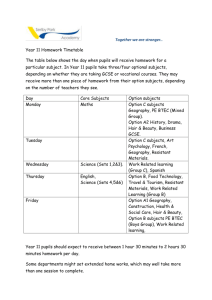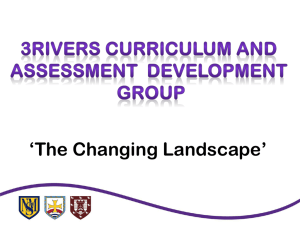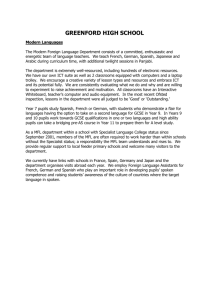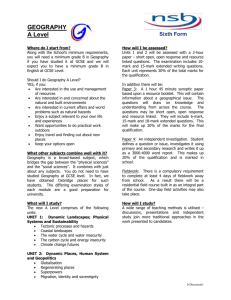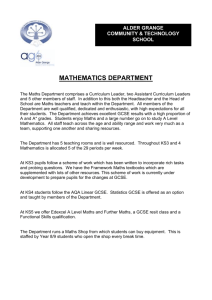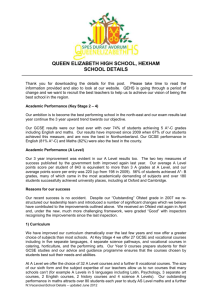Critical Studies - Portslade Aldridge Community Academy
advertisement
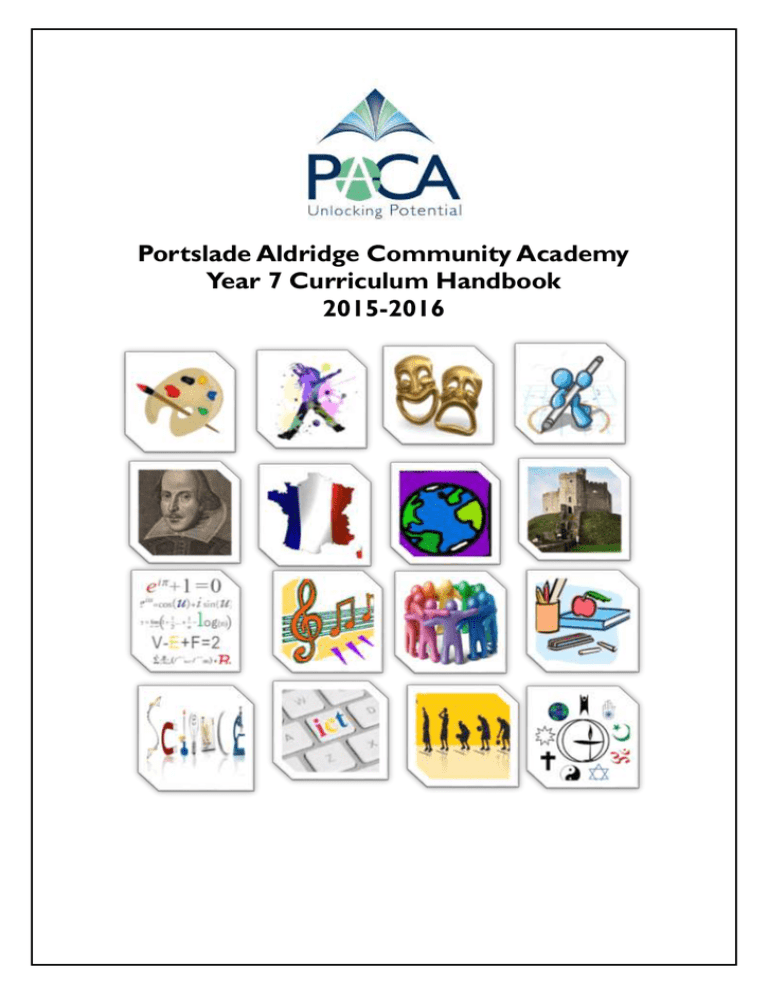
Portslade Aldridge Community Academy Year 7 Curriculum Handbook 2015-2016 Introduction Dear Parent/Carer This booklet is designed to outline the programme of study that your son/daughter will be following over the course of the academic year 2015-2016. Each subject has presented an overview of the topics and skills that will be covered. There is also additional information about what can be done to extend your son/daughter’s knowledge and understanding of each subject. Any concerns or questions you have in response to this should be raised with the subject teacher in the first instance. There is also information about enrichment courses that run within the curriculum, both before, during and after school, on the website, www.paca.uk.com If you have any feedback about this booklet, please complete the reply slip and return to Mrs Burchell in Student Services. At the back of the booklet there is a page summarising the email addresses of people responsible for each subject area. If you have any questions or concerns about a particular subject, please contact them directly. If your query is more general, please contact your son/daughter’s form tutor. Yours faithfully Ms K Scott Principal Summary of Subjects Art 1 Performing Arts 2 English 3 Modern Foreign Languages 5 Geography 7 History 8 Computing 9 Maths 10 Music 11 Religious Education 12 Science 13 Sports/PE 14 Junior Sports Academies 16 Homework 17 ART Students in Year 7 develop the core art skills of Drawing, Painting, Designing, 3D and Textiles. The Year is divided into three themes, one per term. We keep the projects flexible however, to avoid all the groups doing clay at the same time for instance so we may change the order in which the projects are completed. Autumn Term Baseline Assessment. Students are asked to complete a booklet to test their areas of competence in drawing, painting and critical studies. From this we assess their base-line level in order to plot their progress throughout the year and key stage. Still Life Project Our first project is about drawing and painting from still-life objects. This is to develop essential drawing skills from observation, enabling them to use line, tone, texture and colour. Critical Studies The students will be referencing the artist Ray Rex for this project. Christmas card competition for the Aldridge Foundation. Parental support Encouraging students to draw and practice their skills at home. Collect interesting objects (found objects on the beach) etc. Spring Term Sea-Life Project This is a 3D project where students will learn how to experiment with a variety of media. Critical Studies Students will be looking at Sea-Life photography and relevant Artists. Parental Support: Visit to the Sea-Life centre would be beneficial. Collecting shells from the beach. In the Spring Term there will be a formal drawing exam. Summer term Texture and Pattern Clay Project based on Texture and Pattern in Natural Forms. Students will learn how to develop the skills to use clay to create a tile. They will learn how to form clay into shapes and be able to apply surface decoration. Critical Studies Various Ceramic artists including Kate Malone. Parental Support Visit to the Children’s section of Brighton Library where there is a large display of Kate Malone’s work on the wall. Page | 1 PERFORMING ARTS Students in Year 7 develop the following core skills: Creating, experimenting, refining and rehearsing Presenting dance and drama performances Watching, listening and providing an audience Developing a performing arts vocabulary The content of lessons is flexible and teachers will respond to the needs of the class. Therefore, topics and skills will not necessarily be taught in a particular order but will include three of the following: Freeze frames and Image Theatre Students will learn how to create a still image and how this can be used as a component of their drama. Working with Script: The Silent Couple How do we use a script to create a drama? What do we need to add to bring our script from page to stage? Choreography: Creating a dance based on the letters of the alphabet Students will learn the building blocks of choreography and create their own dance. Creating characters: Animal based characters Animal studies are a staple of all professional drama training institutions and are a fun way to creating a character. Dance and Physical Theatre: The Circus This introduction to clowning allows students to play to their strengths of drama or dance. Creating characters: Stock characters We will explore our favourite stock characters and develop a stylised piece of drama. Page | 2 ENGLISH At PACA we want students to love English from the moment they step foot in the English Faculty. A creative environment alongside excellent teaching develops a love of learning, reading and thirst for knowledge. We have a proven track record, the English Faculty at PACA has seen some of the best results in Brighton and Hove; a record we are dedicated to improving upon, year on year. Our students are equipped with the skills and opportunities to make sense of the world as they negotiate a space for themselves within it. Through the study of literature, students explore the worlds of others. All students study literature as it complements language study and, we feel strongly, it is part of our students’ cultural entitlement. Students engage with a variety of literature including fiction and non-fiction texts. Genre studies, poetry, Shakespeare and media are all components of a PACA student’s first year in English. How is the year assessed? At the start of each half term, PACA English students sit a baseline assessment in the format of the GCSE paper linked to the module they’ll be studying that half term. This baseline identifies areas of strengths and areas for development for the module ahead. At the end of each half term, students sit a different paper of the same style, to assess their progress for that half term. Autumn 1 Language Creative Writing: The Titanic Non-fiction stimulus focused on a range of 19th/20th/21st Century texts Assessment: students choose from a photograph/statement as stimulus to produce a descriptive or narrative piece GCSE link: Language paper 1 section B Autumn 2 Literature Genre Study – Conflict ‘The Boy in Striped Pyjamas’ or ‘Private Peaceful’ or ‘Once’.* Assessment: students answer and essay question on the modern text studied GCSE link: Literature paper 2 section A * Texts selected for study will be decided by the class teacher and this decision will be based on the learning needs and interests of the class. Spring 1 Literature Poetry Poems from Other Cultures Assessment: students write their own poem and annotate with analytical commentary GCSE link: Literature paper 2 section B Spring 2 Literature Genre Study – The Gothic Extracts from novels such as ‘Dracula’ and ‘Frankenstein’ Assessment: students answer four reading questions based on the extracts studied GCSE link: Language paper 1 section A Page | 3 Summer 1 Literature Shakespeare ‘A Midsummer Night’s Dream’ Assessment: students answer an essay question on the Shakespeare play studied GCSE link: Literature paper 1 section A Summer 2 Media Group project – Dragons’ Den Assessment: writing and speaking & listening GCSE link: language paper 2 section B and unassessed spoken language Intervention PACA has a unique intervention programme, offering additional support to students when they most need it. This process is reflected upon regularly throughout the year and targets students before they fall behind, based on their personalised target flight plans. Strategies to boost attainment include 1:1 tutoring, focus groups, Lexia software and English Club. Accelerated Reader Reading is a proven strategy for improving general intelligence. Just as exercise improves the cardiovascular system, reading boosts brain power and improves memory. It can also make a person more empathetic; helping young people become well rounded, thoughtful individuals. The English Faculty make it their mission to instil a love of reading within every student. “I don’t like reading!” is a phrase we occasionally hear, to which we say, “nonsense! You just haven’t found the right book yet!” Accelerated Reader is a strategy used in many successful schools nationwide and has the ability to identify the reading range of a student via simple testing. These results are used to determine which books students should be directed towards in the library, to help find the perfect book for them. Regular re-testing ensures that students are always reading a book that will allow them to develop as a reader. Page | 4 MODERN FOREIGN LANGUAGES In Year 7 students will study one term of Language Awareness (body language, sign language, a brief history of languages and tips and tricks to become effective language learners), one term of Spanish and one Term of French. At the end of the year they will have an opportunity to opt to continue French or Spanish for the remainder of the KS3 course. We aim to: ‘Give students the chance to unlock and maximise their potential in order to shape their own futures, to equip them with the skills and confidence to become Independent Language Learners and to broaden their horizons about different cultures.’ We strive to give students the opportunity to develop the skills they need to be successful in the future by providing innovative, high quality teaching and learning for all students, so that they can reach their full potential and achieve beyond all expectations. The MFL department is committed to using a wide range of cutting edge technology as well as ICT suites and individual laptops. New technologies are used to differentiate, motivate and encourage independent learning. Autumn Term: Language Awareness Students learn how and why they study a Modern Foreign Language at school. They will look at how languages have evolved, language families and the history of languages. They learn about accents and dialects, language families, body and sign language and the use of their voice and tone, Listening, Speaking, Reading, Writing tips and tricks. They will learn to identify and develop their learning style and apply this to their language learning. Spring Term: Spanish Part 1 - All About Me & Spanish Part 2 - My World Students will learn how to meet and greet others in Spanish, how to speak about their family and friends, their likes and dislikes and reasons for these. They will develop their understanding of basic grammar and verbs, phonetics and the use of poetry and song in language acquisition. They will use ICT in MFL to develop Independent Study Skills, consolidate and extend their vocabulary and deepen their understanding of Spain and Spanish Culture. They will also take part in cross – curricular activities with Geography and History. Summer Term: French Part 1 All About Me & French Part 2 My World Students will learn how to meet and greet others in French, how to speak about their family and friends, their likes and dislikes and reasons for these. They will develop their understanding of basic grammar and verbs, phonetics and the use of poetry and song in language acquisition. They will use ICT in MFL to develop Independent Study Skills, consolidate and extend their vocabulary and deepen their understanding of France and French Culture. They will also take part in cross – curricular activities with Geography and History. Page | 5 Assessments: Language Awareness is assessed during lessons and through a Homework Project on a MegaLanguage, against a framework of six entrepreneurial attributes or skills: Team Work Problem Solving Creativity Determination Passion Risk Taking In Term 2 and 3, assessment is ongoing throughout the topics, but there are also formal assessments, which take place at the end of each half term and will comprise all four key skills: Reading, Listening. Speaking and Writing. Success Criteria: Students are expected to complete project, learning and written work set for homework each week and revise for the assessments. It is important that they participate as actively as possible in lessons in order to check their understanding and improve their grasp and pronunciation of French and Spanish. How Parents/Carers can help: Students will benefit enormously if they are encouraged to practise their Sign Language, Body Language and French and Spanish at home and are tested on learning set for homework. We also use a variety of websites which involve games students will enjoy in their free time while confirming their grasp of French and Spanish. Skills Developed: Students will develop excellent communication skills through Listening, Speaking, Reading and Writing as well as the use of ICT in MFL and our six entrepreneurial attributes or skills. Useful websites: www.linguascope.com www.languagesonline.org.uk www.wordreference.com www.textivate.com www.yourdictionary.com/languages.html www.ilovelanguages.com/ www.languages-on-the-web.com/ foreignword.com/Tools/tools.htm www.translate-free.com Page | 6 GEOGRAPHY Year 7 is the grounding curriculum for Geography. The curriculum is largely founded upon skills based learning and providing a solid locational framework for further learning in years 8 to 9 and GCSE. Autumn term: Passport to Geography This largely skills-based unit provides an overview of what makes Geography unique as a subject, as well as develop students’ knowledge of maps & mapping, countries, continents and oceans. Fantastic Places In this unit students take an imaginary journey investigating some of the world’s great (natural and human) wonders, such as the Great Barrier Reef and the Great Wall of China, to understand what makes them fantastic places. Spring Term: Who am I? What makes us English? What makes us British? What makes us European? This unit examines identity, nationality and our connections with Europe and the rest of the world. 7 billion and counting In this unit students investigate what is happening to world population – with a special focus on the country of India. Where - and why - is population growing fastest and what are the impacts of such rapid population growth? Summer Term: Eat! The Geography of Food Students investigate questions such as ‘Will we be able to feed a global population of 9billion by 2050?’ and ‘Where does the food I eat come from and what are the impacts of so many food miles?’ Raging Rivers and Fantastic Floods From the River Adur to the River Ganges in Bangladesh, rivers can be both a blessing and a curse to the people who live near them. In this unit, students start to examine the causes and effects of river flooding and how rivers can be managed. Assessment Assessment is ongoing throughout the topics, but there are at least four formal written assessments throughout the year. Homework/ Suggestions for parental support: Homework in Year 7 will largely be project-based with one project set per term. Usually the homework is set in the second week of each term, to be completed over the following four weeks. You can support your son or daughter in Geography by encouraging them to study and use maps, atlases or a globe. Page | 7 HISTORY Year 7 develops key skills a historian needs. The curriculum is delivered:Autumn term: Chronology and time travelling to the land before 1066. This investigation into the similarities and differences between our civilization and those in the past give students a sense of timeless human qualities and very significant changes. It provides students with a chronological framework in which future learning can be placed and comparisons can be drawn. Norman INVASION! In this unit students examine how far the invasion of 1066 changed Britain. Spring Term: Who has got the Medieval Power? Looking at the key events of the medieval era and if and how they changed the power balance between the king, the Church and the people. Reformation rollercoaster Explores how turbulent the Tudor times were. The changing religions during the different reigns and whether its legacy affects us today. Summer Term: Elizabethan exploration Students embark on a voyage and explore the world of the early explorers. The discovery of America and the mystery of the ‘lost colony’. Who was the Industrial Revolution for? Students examine the causes and consequences of the Industrial Revolution and look at the diverse range of experiences people had of it. Assessment Assessment is ongoing throughout the topics, but there are at least four formal written assessments throughout the year. Homework/ Suggestions for parental support: Homework in Year 7 will largely be project-based with one project set per term. Usually the homework is set in the second week of each term, to be completed over the following four weeks. Page | 8 Computing Computing is an incredibly important subject to learn in this modern time, our students have access to the most up to date technology with our five fully equipped ICT suites. Computing ensures that students become digitally literate – able to use, and express themselves and develop their ideas through, information and communication technology – at a level suitable for the future workplace and as active participants in a digital world. Autumn Term: In computing our students do small projects that help them to learn and understand different programs, students will tend to use a range of learning techniques. Music Mix Project The music mix project allows the students to explore the power of computing in a different context from how they would usually use it. Spring Term: Cyber Safety It is very important that our students learn how to keep safe in this new online world, they also pick up impressive presentation and graphic design skills in this project. Kodu Introduction Kodu is a fantastic piece of software that will allow our students to start thinking about coding and how the computers work. Summer Term: Spreadsheets and databases Students will work on a mini project that will enable them to firm up previous knowledge but also let them build on this and move forward in their understanding. HTML programming Introduction The final summer project will be on creating a website in code, this can be built on over the summer and through the next few terms. Page | 9 MATHS Students follow a three year curriculum based on Maths Mastery. The Maths Mastery approach is a cumulative curriculum that promotes students to achieve a deeper understanding by linking key areas together. For example, linking addition/subtraction with Perimeter then Multiplication and Division with Area. Each year the curriculum builds on what was learnt the previous year and consolidates key skills. Through problem solving, the students develop the application of the key skills with an emphasis on reasoning and justification. Better understanding comes from exploring and investigating topics in more depth rather than accelerating through the topics. We are developing the use of concrete manipulatives and pictorial representations; this allows students tackle problems in different forms rather than introducing topics in abstract form. One of the most common hurdles the students face is the ability to quickly recall multiplication facts. To develop fluency with times tables, we are following a program called “Times Table Rockstars”. The students do a 3 minute timed practice three times per week. In addition, to aid fluency with key skills, once per week the students tackle 15 Numeracy questions based on topics ranging from: the 4 operations (+/-/x/÷), ratio and proportion, through to coordinates. These topics underpin all the questions in a GCSE exam. DIRT (Directed Improvement and Reflection Time) is built into the lessons at least once per week. Here the students respond to teacher’s feedback, do corrections from their classwork, homework or weekly Numeracy booklet. Students are assessed at the end of every term. They are given a Cumulative Assessment which tests them on everything they have learnt from the start of the year, culminating in an end of year test. After every assessment the students will RAG rate (Red/Amber/Green) each topic tested; this informs the following terms homework. Using their RAG sheets, the students create their own personalised homework timetable, based on their areas for development, which they will mark in class. Page | 10 MUSIC Term 1 & 2 Baseline Assessment & Commercial Music Baseline assessment Group Composition exploring musical elements and composing to a brief Term 3 Keyboard Skills 1 Introduction to staff notation. Learn basic keyboard skills using the correct fingers, with melody in right hand and chords in the left hand. Term 4 African Music Singing and Drumming focus Perform a traditional African piece as a class with different parts. Vocal harmonies (and opportunities for solo improvisation) and percussion polyrhythms Term 5 Singing Skills Lead in from African Music Learn to sing a song as a class in preparation for the year 7 singing competition. Term 6 Step and Leap Singing performance of a song that is based on step wise movement. Keyboard performance of a song that is based on step wise movement. Compose a piece on the keyboards in AABA structure using small intervals (steps) and some larger intervals (leaps). Spare African Music Learn to play the djembe. Performance/memory skills as a whole class and in small groups. Perform a traditional African piece in small groups using drums and vocals. Page | 11 RELIGIOUS EDUCATION Year 7 develops an understanding of world religions. Autumn term: Christianity and the life of Jesus Christianity is the world’s largest religion and its development in the UK has resounding effects on our culture today. The study of Christianity allows students to reflect on how much of our everyday life in the UK originates from Christian beliefs. Spring Term: Sikhism The unit explores the beliefs and customs of Sikhism and gain an understanding of the Sikh acceptance of other religions. Summer Term: Islam As the second largest religion in the world, the study of Islam is essential for all students. This unit explores the world of Islam and helps students to understand the customs and beliefs of Muslims. The increasing multi-culturalism of Britain allows students to celebrate the diversity of Britain through the understanding of others. Assessment Assessment is ongoing throughout the topics, but there are at least three formal written assessments throughout the year. Homework/ Suggestions for parental support: Homework in Year 7 will add to the knowledge gained during lessons. Page | 12 SCIENCE Year 7 science Science is a core subject and studied by all students from Year 7 to Year 11. At PACA, students study a two year KS3 science curriculum throughout years 7 and 8, having five 80 minute lessons a fortnight in each year. The curriculum aims to feed the student’s fascination and curiosity about the world and how it works, whilst preparing them for their GCSE studies at KS4. The KS3 curriculum is divided into biology, chemistry and physics topics of around 4 – 5 weeks in length and whilst there is a strong emphasis on knowledge acquisition, there is an equally essential focus on skills development in a scientific context. In year 7, students are first taught science in their tutor groups (mixed ability). At the end of the Autumn term following regular formative assessment in class and the Christmas examination, the students are set according to their ability. Sets are then revisited after the spring term and the summer term to ensure excellent progress continues into year 8. Topics taught in year 8 are as follows (please note that within each term the topics are taught on a rota so the order will be different for each class) (Key: biology, chemistry, physics) Autumn term Science skills Cells Particles and their behaviour Separating techniques Spring term Structure and function of body systems Reproduction Forces Space Summer term Elements, atoms and compounds Periodic table Sound Light Assessment: When students first start studying science at PACA, their prior knowledge of KS2 scientific content and skills are assessed. This is in the form of two tests which are carried out in class. From this information we are able to provide the students with individual feedback to allow them to continue to progress through the KS3 curriculum. At the end of each term, the students sit a one hour written examination which assesses their knowledge of the topics they have covered in the previous term. The paper consists of questions covering both skills and scientific content and take the form of multiple choice questions, short 2-3 mark questions and longer 6 mark questions. Equipment: During Key Stage 3 the students will be expected to have with them basic equipment, which they will use regularly. This includes: a pen, a pencil, a rubber, a pencil sharpener, a calculator and a ruler. Home Learning: The resources we use to deliver the KS3 curriculum can be accessed by students at home once they have received their password and username. The website is www.kerboodle.co.uk. At times teachers will set homework from this website. It will also provide students with materials and activities to help with their revision. Page | 13 SPORTS/PE In year 7, students will study physical education through 4 key areas – Accurate Replication, Performing at Maximum Levels, Outwitting Opponents and Exercising Safely and Effectively. Students will develop their abilities through a range of different sports over the four terms, including football, rugby, ultimate Frisbee, netball, gymnastics, athletics, rounders, cricket, basketball, badminton and handball amongst others. The first two terms will be based on fundamental assessment, skill development and preparation for the physical education ahead of them. Initially, students will be assessed so that meaningful targets for their flight path through key stage three can be set appropriately. During term two students will take part in a range of activities developed to build teamwork, leadership and independent learning skills as well as developing knowledge of how to prepare for exercise safely. Students will also monitor their fitness levels for a range of health and skill related components of fitness over their time at PACA. Every student will take part in a different fitness test at the start of every term. Each test is repeated twice every year and they will track their progress over time. This also provides an opportunity to study health and wellbeing. Outwitting Opponents: Basic passing techniques Simple movement – as an individual Working in small teams Basic positional awareness Basic levels of tackling Rudimentary tactics – attacking and defending Basic skills in travelling with the ball Evaluate the performances of self and others in order to give positive feedback Identify at least one way in which to beat an opponent Accurate Replication: Use a limited range of movements Copy and use basic travelling skills Confidence at low speed and height levels Basic analysis of the work of others Know the basic principles of canon, unison, mirror and match Be able to link simple skills together Understand and show evidence of body tension, extension, and control in basic shapes Be able to evaluate own performance and that of others Performing at Maximum Levels: Co-ordinate body parts for throw, run and jump events Improve performance of basic techniques and skills Evaluate own performance Begin to be able to describe how to improve own performance Begin to lead short warm ups in small groups Page | 14 To push yourself to your full potential Exercise Safely and Effectively: Use equipment safely Understand how to set up and run events safely Understand how exercise is good for your health, and begin to understand the effects it can have Understand the importance of checking area for safety before use Understand why taking part in exercise can improve health Understand the necessity and elements of a warm up. Begin to lead own warm ups/cool down. Students at PACA will have access to a full and varied extra-curricular timetable where they can improve their skills further, as well as have the opportunity to represent the Academy in competitions, cups, leagues and tournaments. All clubs provided are free of charge and completely optional. Students will also have an opportunity to take part in a range of interhouse competitions throughout the year. Students can expect: high level physical education lessons, delivered with a consistent approach. Students will have access to a good level of equipment that will allow them to progress in their learning. When students work hard in their lessons their effort will be praised. Any sanctions required will be issued fairly and in accordance with Academy policy. Physical Education Teachers expect: students to take responsibility for their own learning in physical education lessons. This means working to the best of their ability at all times. Students will need full PE kit for every lesson – even if they have a note to say that they are not taking part practically. This will allow students to still have an educational experience during the lesson, even if it is not in a practical session. Students must arrive to lessons on time, with a positive attitude towards their learning experience and towards the learning experience of others. Page | 15 Junior Sports Academies In year 7, students can opt to be a part of the exciting sports academies at PACA. If students are successful at the trials/auditions they will follow a bespoke curriculum which will be based around their chosen activity of football or Dance. During their PE curriculum time they will be led by highly qualified, professional coaches/teachers who have specialised in that particular activity. Alongside their curriculum time they will be provided with extracurricular opportunities in that chosen activity. In addition to the students being provided with the opportunity develop in their chosen activity, it is crucial that they take part in a broad and balanced PE curriculum which will be provided in their normal PE lesson once a fortnight. The junior academies are a fundamental pathway into the wellestablished and successful senior academies. Junior Football Academy: Coaching by professional level 4 football coaches (UEFA A Licence) Access to professional football clubs and the scouting network Extra coaching and support alongside their normal PE lessons following a bespoke curriculum Technical sessions, small sided games plus speed, agility and football based fitness training. All designed to develop players skills and abilities Leadership in football opportunities Regular league and cup fixtures Personalised kit Junior Dance Academy: Styles such as Ballet, Contemporary, Street, Jazz and Modern will be covered broadening their overall skill set Allows for progression in three main areas – technical ability, performance quality and creativity through the use of choreography Extra coaching and support alongside their normal PE Lessons Performance opportunities to develop and understand the nature of the industry and life as a dancer Regular dance performances Leadership in dance opportunities Bespoke PE lessons focussed on the Junior Dance Academy curriculum Page | 16 HOMEWORK Research shows that children who are supported by their families with homework are likely to achieve better academic outcomes than those who do not Guidelines Year 7 30 minutes English, Maths, Science, Geography, History, MFL. (Core subjects in Autumn 1 only) Year 8 30 minutes Year 9 30 minutes Year 10 45-60 minutes Year 11 45-60 minutes English, Maths, Science, Geography, History, MFL. English, Maths, Science, Art, Computing, Geography/History, MFL, Music (per fortnight). English , Maths, Science, Option A, Option B, Option C. English , Maths, Science, Option A, Option B, Option C. Homework should be challenging, consolidate learning and deepen understanding. Therefore, homework tasks will take a number of forms (e.g. learning homework’s, written responses, creative project-based assignments etc.). All homework will have a clear learning objective, that will be shared with students and the form that the task takes will be linked to this objective. The table above outlines the expectations regarding frequency and duration of homework for students in each year group. So that homework can achieve its intended objectives, there is no stipulation regarding how long students have for completion, other than a minimum of 48 hours. Work should not be set on Friday for submission on Monday. All homework will be shared with the students in class and will be recorded onto MILK. MILK is a school planner app that allows students to access their timetable and homework diary through their smart phones, or online. How can you help? 1. By showing an interest you are communicating the fact that school work is important and needs to be taken seriously. 2. Encourage children to complete homework to the best of their ability. 3. Urge children to have less screen time and spend more time studying and reading. 4. Express high expectations for children from an early age. The Benefits Parents who take an interest in their children's homework have a better knowledge of their education. Additionally, children who are able to complete assignments successfully are likely to develop a good working attitude. Page | 17 Why is Homework Important? Homework set prior to a lesson can aid understanding later in class. Homework also provides opportunities for reinforcement of work learned during school time and for children to develop their research skills Working to meet deadlines promotes self-discipline, an attribute which will impact on school work and beyond. Practical Ways to Help Provide a quiet environment Have a Regular Homework Routine Praise Effort and Achievement Show an Interest by talking to them about what they are learning Provide Equipment Set a Good Example Monitor Homework Problems with Homework If there are problems with homework, communicate with school at an early stage and work together to bring about a resolution. Email or phone your child's teacher to discuss the situation. School Homework Support Teachers are always more than happy to support students with homework. There are homework support clubs after school and in addition student can use the library afterschool to complete homework and access ICT resources. Page | 18 Email addresses for Key Staff at PACA Heads of Faculty Email Addresses: Mr E Vale Maths e.vale@paca.uk.com Mrs V Orchin English v.orchin@paca.uk.com Mrs J Taylor Science, including STEM j.taylor@paca.uk.com Mr C Mellett Entrepreneurship, inc:- c.mellett@paca.uk.com Business ICT Media Mrs A Gascoigne Global Faculty, inc:- a.gascoigne@paca.uk.com MFL History Geography Religious Education Psychology Ms S Durham Creative Faculty, inc:- s.durham@paca.uk.com Art Music Drama Page | 19
